You’ve heard it from some person in authority by now: Gatherings of 10 or more people are forbidden! Luckily for us, most board games boast a max of far fewer players than that.
I haven’t fact checked this, but I’d guess that most board games support a minimum of 2 players and maximum of 4 players – probably because that is close to the size of your average family and an easily rounded up number of people in general.
But with the general lack of socialization happening around the world due to various degrees of isolation, my guess is you know more than 3 people who are desperate to get out of their homes and play a game with friends.
So I’ve put together a list that features games for more than 4 players but less than 10 because while we want you to continue gaming together during all this social distancing, we want you to do so responsibly. Why 7 and not 8 or 9? Because we here at Nerds on Earth don’t like flirting with disaster. 7 is far enough from 10 to at least give us the illusion of responsibility!
I tried to intentionally include a spread of game types as well; some co-op, some competitive, some light, some heavy!
7 Games for 7 People: Board Game Options During COVID-19
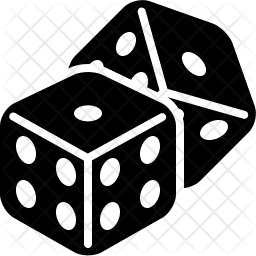 Mysterium
Mysterium
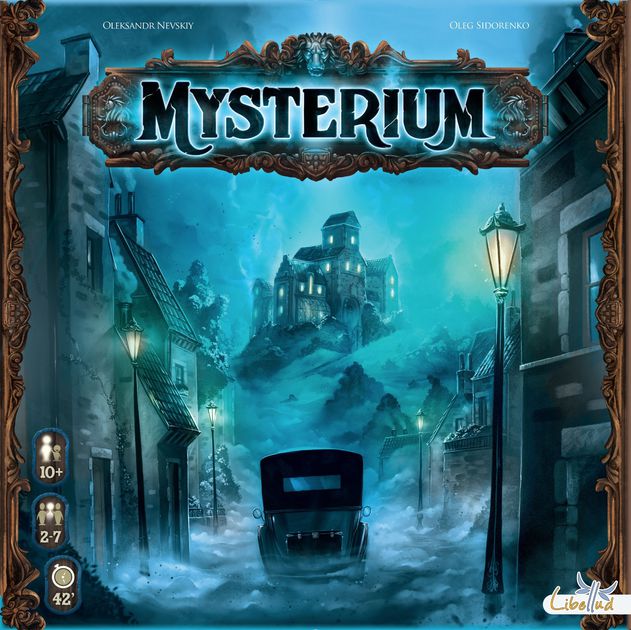
Mysterium is a wholly cooperative game in which players must work together to identify a ghost’s killer, place of death, and the killer’s weapon of choice by deciphering cryptic clues provided by the ghost in the form of the cards of whimsical art we’ve now grown very familiar with.
The ghost has a unique set of people, places, and objects for each player behind his or her screen and uses vision cards to lead each player to the appropriate choice for each. Once all players have received their vision cards, they use a token to indicate their guess based on the vision cards given and the ghost indicates whether or not they were correct in their guess. A correct guess of the person allows them to receive visions for the place, and a correct guess of the place to the object.
After 7 turns are up or after all of the players have correctly deduced their clues, the ghost then plays three more vision cards that will clue the other players in to which of the person/place/object groupings reflects the truth! Players are able to look at 1-3 of those cards depending on their clairvoyancy rating and must vote on a grouping without discussing it with the other players.
If the correct grouping is selected by a majority of the players, they win! Otherwise they lose and the ghost continues in its unrest.
Grab a copy of Mysterium here.
 Cash N Guns
Cash N Guns
Cash N Guns is among the lighter offerings on this list, and, as a bonus, the only game components that will be touched by more than one person during the course of the game are the desk standee and loot cards.
The concept of the game revolves around splitting up a series of “takes” or robberies. Loot is placed face up on the table and every player chooses to play either a “Click” or a “Bang!” card. This will determine whether or not they actually pull the trigger on the person they aim their foam gun at.
On the count of 3, everyone points their gun at someone else at the table. The Boss for that turn may then force one player to change their target if they’d like. Players have a chance to bow out of the take (thus giving up the chance at any of the loot) or stay in and risk getting shot. A shot also results in them missing out on any loot plus they get a wound. 3 of those and you’re out of the game.
The person with the most value in loot at the end of eight rounds wins. This game plays pretty quickly regardless of the number of players you have because there aren’t strictly individual turns, so multiple rounds can be enjoyed in short order. There are also “powers” you can play with for a bit more variety.
Cash N Guns can be grabbed up here!
 Codenames
Codenames
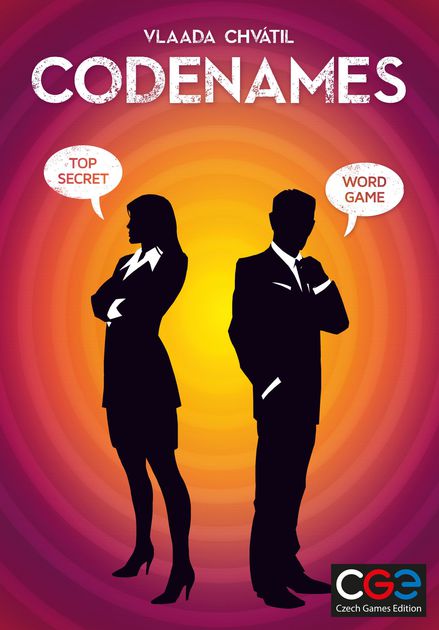
Codenames (one of our favorite party games) is best played with an even number of people so that teams feature an equal number of players, but you can make it work with 7 with very little effort. Different sized teams does not necessarily mean that they are unevenly matched!
Each team elects a Spy Master who sits across the table from the other players. They arrange a tableau of 25 cards with words on them in the center of the table, then draw a special card that lets them (the Spy Masters) see where their colored agents are hiding in the field.
The Spy Master’s job is to give one word clues to the codenames of their agents in the field in the hopes that their team can deduce where they are. After every clue, the team must select at least one card in the field but can select as many as they’d like, with each selection being a guess at one of their team’s agents’ codenames.
A correct guess reveals the agent and gives them the option to make another. However, they might also uncover one of the opposing team’s agents, a civilian, or even the Assassin (which results in an automatic loss for their team!).
The first team to identify all of their agents in the field wins!
One of the best things about Codenames is the variety of themes they come in. Marvel, Harry Potter, Disney, The Simpsons, and other variations are out there, so you’re sure to find one that appeals to your group! Find the vanilla version of the game here, but feel free to browse for another flavor!
 Sherlock Holmes: Consulting Detective
Sherlock Holmes: Consulting Detective
This is a fun co-op game I just discovered recently myself. Play begins when a short narrative is read that lays out the known details about a crime. It is then up to everyone at the table to take turns choosing what leads to follow all over London, unearthing new information all along the way.
Players must work together to make sense of any information they amass by chasing down the various leads. But here’s the catch: They are in direct competition with Sherlock Holmes himself! Players must keep track of how many leads they follow by the time they decide to answer a series of questions about the case to test the truth of their deductions.
They receive 10-25 points for answering the case questions correctly, but lose 5 points for every lead they followed in excess of the number Holmes did. So if the group ended up chasing down 5 more leads than Holmes, their final score will be docked 20 points. And the goal, of course, is to beat Holmes at his own game!
There are at least three of this series of games out there right now, each boasting 10 mysteries. The drawback to a game like this is the complete lack of replayablity, but with so many cases per box and so many boxes on the market, if you come to love it there’s plenty to keep you playing for the foreseeable future.
Sherlock Holmes: Consulting Detective – The Thames Murder and Other Cases can be found without a magnifying glass here.
 Between Two Cities
Between Two Cities
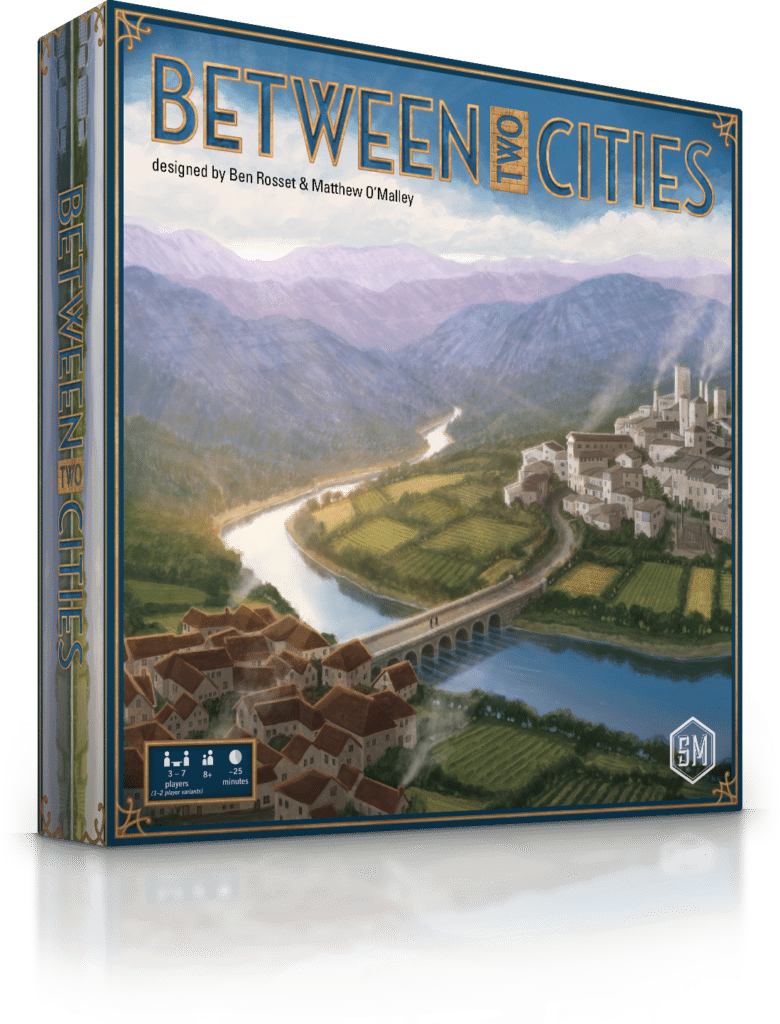
Stonemaier Games’ Between Two Cities is a quirky mix of co-op and competitive games. It is a tile-drafting game during which you will build two cities: One between you and the partner on your left with their help, and one between you and the partner on your right with their help.
Each turn, you’ll select two tiles and place one in each of your cities. Each tile has its own rules for how to score it, so placement matters. There are also set collection elements to the game! This leads you to having to coordinate with each of your partners when it comes to both the choice and placement of your tiles and theirs for the city you share.
Once every city is assembled into a 4×4 grid, end game scoring commences, and that is when the competitive element comes through. Your final score is the lowest score of your two cities (which prevents you from prioritizing one of your cities over the other). So the person with the highest lowest score wins, ha! It is a fun change to the standard way of such things.
Between Two Cities plays very quickly and requires very little set up, which makes it an ideal candidate for back to back plays. Grab it here. You could also give Between Two Castles of Mad King Ludwig a go – a mashup of Between Two Cities and Bezier Games’ Castles of Mad King Ludwig.
 Cosmic Encounter
Cosmic Encounter
Alright, I’m admittedly having to bend the rules a bit here, but I’ve been spoiled. One of my gaming buddies has pretty much all of the expansions for Cosmic Encounters, which allows for more players than the base game affords. To hit the 7 player mark this list requires, you’ll need two of the following three expansions:
- Cosmic Alliance
- Cosmic Conflict
- Cosmic Incursion
Each adds the ability to play with an additional player, plus other content like races and rules.
Each player selects a race and is dealt a hand of 8 cards they will use during the titular cosmic encounters that comprise the gameplay. They then draw from the Destiny deck that determines which player they’ll have an encounter with on that turn. They’ll then select a planet controlled by that player and launch an attack with the hopes of defeating their opponent and colonizing the world. They threaten the attack with 1-4 ships of their own.
Alliances are then offered and accepted or declined on both sides of the battle line, meaning that the offense and the defense can recruit aid from any inactive players who will commit 1-4 ships of theirs. Each ship on either side adds 1 point to their team’s total, and the highest total wins. The total is further affected by the Encounter card played by each team.
Ships defeated in battle (included any allied ships!) are sent to the warp and can be regained one at a time at the start of each of the player’s subsequent turns. The victors take up residence on their new planet. The first player to acquire their fifth foreign colony wins!
Cosmic Encounter is probably the “heaviest” game on this list with lots of fiddly bits – especially with the expansions. And with 7 players this game will take a hot minute to play, but what else have you got to do with the coronavirus running wild?! Grab the base game here.
 Formula D
Formula D
Formula D is a tabletop racing simulator where the goal is to move your car around a track before anyone else does. You do this primarily by shifting gears which lets you roll a corresponding die for movement:
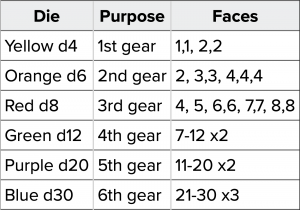
But this isn’t a sprint down a straight-as-an-arrow quarter mile course. You’ll have to navigate turns, stopping your car’s movement on them a number of times before exiting or taking damage if you zip right on through. Too much damage and your car explodes!
The game comes with basic and advanced play and rules, plus a street-racing variant on the back. It can be as simple or as complex as you’d like, and if the two tracks included in the game aren’t enough, you can hunt down some of the older Formula De (that ‘e’ didn’t make it to the update!) tracks as they’re fully backwards compatible.
Game length is also adjustable as you can try to go for a single lap (and maybe press your luck a bit more through those turns!) or three (which will probably require a bit more conservative approach, but you do you, pal!).
Formula D can be purchased here.
You can do a lot of gaming with less than 10 people, for sure. But break that 4-player mold a bit by giving one of these titles a spin!

